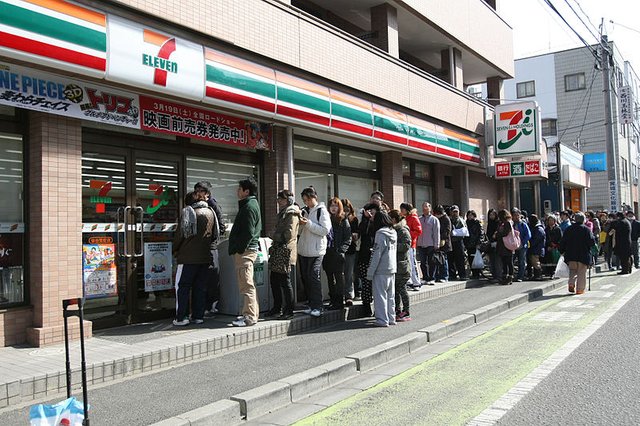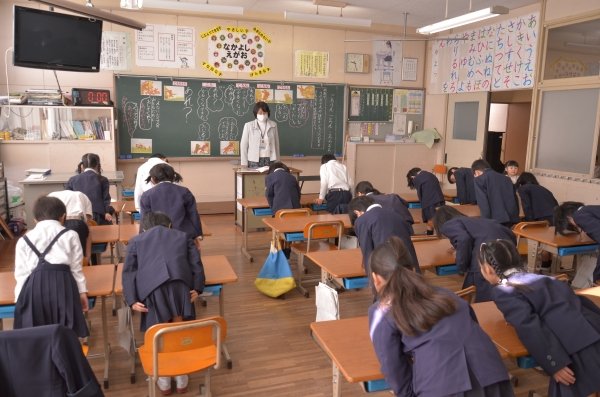Mindfulness: Why Japan Is So Orderly and Its Valuable Lesson for You
The Japanese response to the Tohoku earthquake still stands out as a shining example of the country's orderliness. Although the previous linked article attributes it to gaman (forbearance, self-control), I think there is another Japanese principle at work: being teinei. This word encompasses "polite" -- especially the part of politeness that is about making other people feel more comfortable -- but it also includes a sense of care in every act, and even delicacy. Although you can say someone is "too polite," or "too rigid," I have never once heard teinei used as anything but a compliment.

Similarly, although Japan can be criticized for its rigid social rules and group mentality, one look at its globalized technology, pop culture, traditional culture, and art makes it obvious that Japanese people are doing many things right. It is currently 16th in the Quality of Life Index, despite being a small island nation and having suffered defeat and nuclear destruction in WWII, as well as regularly undergoing earthquakes and tsunamis.
Each country has a different overall philosophy which greatly impacts its character. For example, American children are constantly encouraged to aim high, be unique, and try new things. Many Americans sincerely believe that the United States is the "most free" country on earth. And even non-Christians who grow up in America are subconsciously influenced to some degree by Christian values. These are some of the qualities that define America overall, and contribute to its individualistic, innovative character.
Japan encourages its children to help one another and try their best no matter what. Japanese people do not believe their country is the "most free." Instead, they believe it has a valuable and rich culture, and prize how teinei its people are: Japan may be ranked 16th in overall Quality of Life, but it's ranked 4th in public safety. Because it focuses more on group benefits, as my old Japanese boss once said to me, "America has more people in the highs and lows; Japan has more people in the middle." He was talking about innovators, inventors, creators, the rich and poor -- everything. We agreed that this isn't really "better" or "worse." But, we can definitely learn from each other.

The Japanese quality that most strikes me as extremely prevalent and extremely different from American culture is that teineiness. Every junior high and high school class begins, "Stand up." Responding, "Hai," all of the students stand, bow, and sit. I noticed that Japanese children are incredibly good at drawing, but that also, many of them draw in a very similar fashion. If you ask an American child to draw a rabbit, who knows what it will look like: the child will make it up as they go. However, if I asked a Japanese child to draw a rabbit, even in different schools, I would usually get the same neatly-drawn bunny face with its perfect ears sticking straight up. Every child carries a clean, carefully-folded handkerchief. By the school shoe boxes there were signs reading, "Disorderly shoes make a disorderly heart."
American children might bristle at this. "Why does it matter how I put my shoes in?" It is silly, isn't it? What does it really matter if you kick your shoes off by the door when you get home? What does it matter whether your clothes are neatly put away, or your desk is neat? Einstein's desk was infamously messy.
This is completely missing the point. It's not about being tidy. It's about mindfulness. It's about not sleepwalking through life. Are you flinging your shoes down with focused, purposeful gusto? Or are you just tiredly pulling them off and tossing them without thought? And are you considering how you affect others?
This Japanese website sells scented essences. The site includes advice to do things like set the bottle down in a very purposeful way, adding, "Just by taking this moment to increase your awareness, you will be working with Ray Essence." Obviously, there's some marketing at work here to glorify the essences, but focused, purposeful action -- even for minuscule things like setting down a cup or a pair of shoes -- has an incredible effect on human beings.
Does this sound similar to meditation? It is. I don't mean it's similar. It is meditation. It is possible to constantly meditate all through life. Many Japanese people do just that without even thinking of it as meditation. It's very good for self-awareness, productiveness, and consideration of others and your surrounding world. One form of meditation is to simply focus on your breath and breathe purposefully. It's not meditation because you're breathing in some magical way; it's meditation because of the mindful focus.
If this is too vague-sounding, New-Agey, or Eastern for you, take a look at this article about psychological study of the phenomenon of purposeful action. Psychologist Anders Ericsson emphasizes that the key to effectively acquiring a new skill is to pay attention. Strumming a guitar without concentrating on the way you are holding your fingers, how you are striking and holding the strings, and the subtle differences in sound is less useful than imagining those details without even having a guitar in the room.
The reason Japanese people are so precise and careful in their engineering and art is that they constantly practice mindfulness. Folding a handkerchief perfectly is simply a way of ensuring that you are paying attention to what you are doing.
Try taking that extra step to focus on mindful action. When you walk down the street, focus on the sounds, smells, and sights in close detail. Look at the pattern of bark on a tree and think about it. Pay attention to the people around you. Consider your posture, the way you walk. Even lifting a hand, as bellydancers show, can be an excellent exercise in mindful action.
Try a tiny mindful action right now. For example, lift your head in a slow, precise way; stretch out and then close your hand purposefully; deliberately lift and set down a cup; fold a napkin or clothing item carefully. See how you feel. Then take that feeling, and create it all through your life.
Image Sources
7-11 line
Japanese class
It's official. You are definitely my favorite writer on Steemit. I loved this article. I practice mindfulness too, but I often forget and get lost on autopilot. Thank you for this beautiful reminder!
Thank you very much. ^_____^
To be honest, pretty much any article I write about how people should live/think/feel is at least halfway a reminder to myself. ^.^;
Oldie but goodie. Thanks for this.
I can attest to the tsunami response: lived on the Iwate coast in Miyako when it happened, spent 6 weeks or so homeless and working front line response, and despite the craziness of that situation one thing that will forever stick out in my memory is how caring everyone was for everyone else.